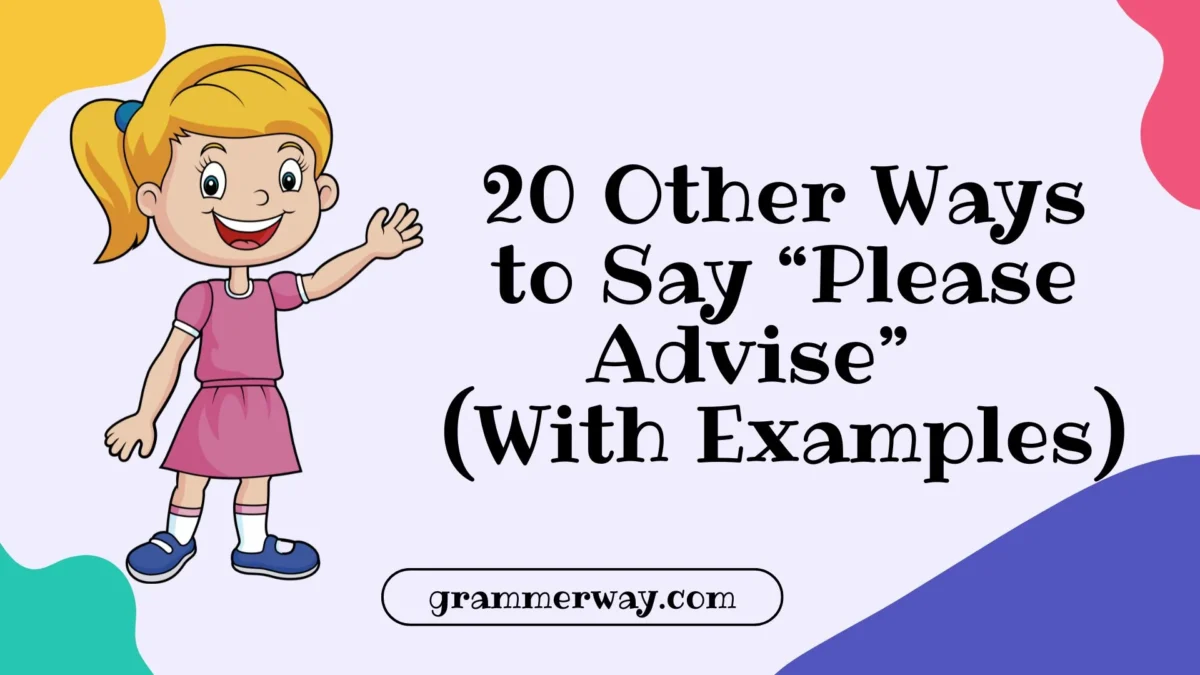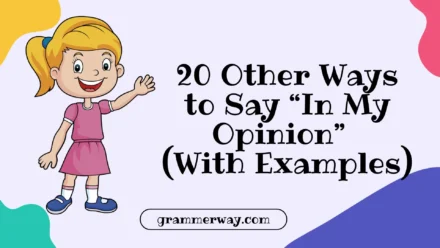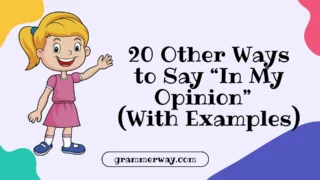Finding the right words to express care and respect is a skill that makes communication truly meaningful. The phrase “please advise” is polite and direct, but it can sometimes feel too formal or distant. By using warmer and more thoughtful alternatives, you can make your emails and messages sound more human, genuine, and approachable. These 20 other ways to say “please advise” will help you connect with people while keeping your tone polite, kind, and professional.
What Does “Please Advise” Mean?
The phrase “please advise” simply means “please tell me what to do next” or “please share your opinion or decision.” It’s commonly used in workplaces, emails, and professional communication when someone needs clarity, confirmation, or direction.
Is It Professional or Polite to Say “Please Advise”?
Yes, “please advise” is technically both professional and polite, but it can sometimes sound robotic or impersonal. If you want your message to carry warmth, empathy, and understanding, try using softer alternatives that feel more conversational and thoughtful.
List of Synonyms for “Please Advise”
- Could you please let me know
- I’d appreciate your guidance
- Could you share your thoughts
- What are your thoughts on this
- Could you please advise when convenient
- I’d love your input
- May I ask for your advice
- I’d be grateful for your feedback
- Could you please clarify
- I’d appreciate your thoughts
- Would you mind sharing your opinion
- Can you please confirm
- I’d like your recommendation
- Please keep me updated
- I’m looking forward to your feedback
- Would you please review this
- Please let me know your decision
- I’d love your perspective
- Could you help me understand
- Please share your feedback when you can
1. Could You Please Let Me Know?

Scenario: You’re waiting for a response, update, or confirmation and want to ask politely without sounding pushy.
Meaning: This phrase means you’re politely requesting information or clarification while showing patience and respect for the other person’s time.
Examples:
- Could you please let me know if the report is finalized?
- Could you please let me know when you’re available for a quick call?
- Could you please let me know if the shipment has been sent?
- Could you please let me know your feedback by Friday?
- Could you please let me know who will attend the meeting?
Tone: Polite, warm, and professional.
Explanation: Using this phrase adds a gentle and considerate touch to your request. It invites a response while sounding respectful and understanding, making your message feel approachable and kind.
2. I’d Appreciate Your Guidance

Scenario: You’re asking for help or direction from someone with more experience or authority.
Meaning: This phrase means you value the other person’s insight and want their advice before taking action.
Examples:
- I’d appreciate your guidance on how to handle this issue.
- I’d appreciate your guidance in preparing the presentation.
- I’d appreciate your guidance before sending the final draft.
- I’d appreciate your guidance on the next steps.
- I’d appreciate your guidance in responding to this client.
Tone: Respectful, appreciative, and humble.
Explanation: It shows genuine respect for the other person’s experience and creates a tone of collaboration and gratitude, which makes your request sound warm and sincere.
3. Could You Share Your Thoughts?

Scenario: You want feedback or opinions from a colleague, manager, or client.
Meaning: This phrase means you’re inviting open communication and collaboration by asking for their perspective.
Examples:
- Could you share your thoughts on this proposal?
- Could you share your thoughts about our marketing plan?
- Could you share your thoughts on improving this design?
- Could you share your thoughts before we move forward?
- Could you share your thoughts after reviewing the document?
Tone: Inclusive, open, and thoughtful.
Explanation: It promotes a collaborative tone and encourages teamwork, showing that you value the other person’s ideas and opinions genuinely.
4. What Are Your Thoughts On This?

Scenario: You’re discussing ideas, plans, or next steps and want the other person’s opinion.
Meaning: This phrase simply means you’re inviting someone to share their input or perspective about a specific topic.
Examples:
- What are your thoughts on the new schedule?
- What are your thoughts on this marketing strategy?
- What are your thoughts on my latest draft?
- What are your thoughts on moving the deadline?
- What are your thoughts on the client’s feedback?
Tone: Friendly, open, and respectful.
Explanation: It sounds conversational and engaging, encouraging others to share openly without pressure, which helps build a sense of connection and trust.
5. Could You Please Advise When Convenient?

Scenario: You need a response but want to sound considerate of the person’s time and schedule.
Meaning: This phrase means you’re asking for feedback or a decision, but with politeness and flexibility.
Examples:
- Could you please advise when convenient regarding the next steps?
- Could you please advise when convenient about the meeting time?
- Could you please advise when convenient if you’ve reviewed the file?
- Could you please advise when convenient on your availability?
- Could you please advise when convenient regarding your approval?
Tone: Professional, courteous, and considerate.
Explanation: It shows respect for the recipient’s time and priorities, helping you maintain professionalism while sounding patient and understanding.
6. I’d Love Your Input

Scenario: You’re working on a project, plan, or idea and want someone’s feedback or suggestions.
Meaning: This phrase expresses that you genuinely value the other person’s opinion and want their creative or professional input.
Examples:
- I’d love your input on this new campaign direction.
- I’d love your input before I finalize the presentation.
- I’d love your input on the best way to handle this request.
- I’d love your input to make sure we’re aligned on this.
- I’d love your input on how we could improve the report.
Tone: Warm, engaging, and collaborative.
Explanation: This phrase makes the recipient feel valued and included, which strengthens teamwork and makes your communication sound kind, genuine, and inviting.
7. May I Ask for Your Advice?

Scenario: You’re seeking personal or professional guidance from someone you trust or respect.
Meaning: This phrase politely shows that you respect their experience and judgment enough to ask for help.
Examples:
- May I ask for your advice on how to approach this client?
- May I ask for your advice before sending my application?
- May I ask for your advice about this scheduling conflict?
- May I ask for your advice on improving this section?
- May I ask for your advice before making a final decision?
Tone: Respectful, humble, and thoughtful.
Explanation: This expression builds a tone of trust and respect, helping you sound sincere and grateful while asking for assistance.
8. I’d Be Grateful for Your Feedback

Scenario: You want someone to review your work and share their honest thoughts in a kind way.
Meaning: It’s a heartfelt way of asking for feedback while showing gratitude and humility.
Examples:
- I’d be grateful for your feedback on the attached document.
- I’d be grateful for your feedback about the recent changes.
- I’d be grateful for your feedback before our next meeting.
- I’d be grateful for your feedback regarding this layout.
- I’d be grateful for your feedback on the final version.
Tone: Appreciative, kind, and professional.
Explanation: Using this phrase demonstrates gratitude and openness to improvement, making your message feel warm and cooperative instead of cold or demanding.
9. Could You Please Clarify?

Scenario: You didn’t fully understand something and need a clearer explanation.
Meaning: This phrase means you’re politely asking for more details or clarification about something unclear.
Examples:
- Could you please clarify what you meant in your last message?
- Could you please clarify the next steps for this project?
- Could you please clarify who is responsible for this task?
- Could you please clarify the timeline for completion?
- Could you please clarify if I need to include these files?
Tone: Polite, calm, and direct.
Explanation: It shows that you’re curious and willing to understand properly, without sounding impatient or critical, which keeps communication smooth and respectful.
10. I’d Appreciate Your Thoughts

Scenario: You want to sound approachable and kind when inviting opinions or feedback.
Meaning: It’s a gentle and humble way to ask for someone’s input or perspective.
Examples:
- I’d appreciate your thoughts on the proposal I sent.
- I’d appreciate your thoughts before I make any edits.
- I’d appreciate your thoughts on this approach.
- I’d appreciate your thoughts after reviewing the document.
- I’d appreciate your thoughts on improving our next campaign.
Tone: Warm, respectful, and encouraging.
Explanation: This phrase shows gratitude and openness, encouraging collaboration and making others feel comfortable sharing their honest views.
11. Would You Mind Sharing Your Opinion?

Scenario: You want to ask for someone’s viewpoint politely and respectfully.
Meaning: This phrase gently asks for their personal perspective or evaluation on something specific.
Examples:
- Would you mind sharing your opinion on this new idea?
- Would you mind sharing your opinion about our next step?
- Would you mind sharing your opinion on how we can improve?
- Would you mind sharing your opinion regarding this situation?
- Would you mind sharing your opinion before I finalize it?
Tone: Kind, considerate, and professional.
Explanation: It makes your tone sound friendly and respectful, giving space for open dialogue without sounding demanding or rushed.
12. Can You Please Confirm?

Scenario: You’re seeking confirmation or verification of something before moving forward.
Meaning: This phrase means you want to double-check details or approval in a polite, straightforward way.
Examples:
- Can you please confirm if the meeting is still at 2 PM?
- Can you please confirm if you received the package?
- Can you please confirm your attendance for the event?
- Can you please confirm the final version of the file?
- Can you please confirm if the invoice was paid?
Tone: Polite, professional, and clear.
Explanation: It’s simple and efficient, making it ideal for clear communication while remaining respectful and business-friendly.
13. I’d Like Your Recommendation

Scenario: You need help choosing between options or making a decision.
Meaning: This phrase means you trust someone’s expertise and want them to recommend what’s best.
Examples:
- I’d like your recommendation on which plan we should follow.
- I’d like your recommendation before we finalize the budget.
- I’d like your recommendation for the best vendor option.
- I’d like your recommendation about how to address this issue.
- I’d like your recommendation before I submit the proposal.
Tone: Respectful, trusting, and sincere.
Explanation: It reflects respect for the recipient’s knowledge and makes them feel valued for their opinion, strengthening mutual trust.
14. Please Keep Me Updated

Scenario: You want to stay informed about progress or developments.
Meaning: This phrase asks someone to share updates or changes as they happen.
Examples:
- Please keep me updated on any new developments.
- Please keep me updated if the schedule changes.
- Please keep me updated about the client’s response.
- Please keep me updated as soon as the results are ready.
- Please keep me updated on the project’s progress.
Tone: Professional, direct, and friendly.
Explanation: It communicates ongoing interest and involvement while keeping your tone courteous and efficient.
15. I’m Looking Forward to Your Feedback

Scenario: You’ve completed a task or shared work and are waiting for a response.
Meaning: It’s a polite way of saying you welcome feedback and are eager to hear their thoughts.
Examples:
- I’m looking forward to your feedback on my draft.
- I’m looking forward to your feedback before our next step.
- I’m looking forward to your feedback on the updated layout.
- I’m looking forward to your feedback after reviewing the file.
- I’m looking forward to your feedback on this version.
Tone: Polite, positive, and open.
Explanation: It communicates optimism and readiness to improve, keeping the tone friendly and forward-looking.
16. Would You Please Review This?

Scenario: You’re asking someone to check your work or confirm its accuracy.
Meaning: This phrase means you’re requesting a review or verification in a polite and respectful way.
Examples:
- Would you please review this report before submission?
- Would you please review this document for accuracy?
- Would you please review this before we send it to the client?
- Would you please review this draft and share your notes?
- Would you please review this version and let me know your thoughts?
Tone: Polite, professional, and respectful.
Explanation: It’s a gracious way to ask for help, showing appreciation for the other person’s time and effort while keeping the message concise and kind.
17. Please Let Me Know Your Decision

Scenario: You’ve presented an idea, proposal, or offer and are waiting for a final response.
Meaning: This phrase means you want the recipient to share their conclusion or choice politely.
Examples:
- Please let me know your decision by Monday.
- Please let me know your decision after reviewing the proposal.
- Please let me know your decision on the next step.
- Please let me know your decision so we can proceed.
- Please let me know your decision at your earliest convenience.
Tone: Polite, clear, and respectful.
Explanation: It’s a professional and gracious way to prompt a reply without sounding impatient, helping maintain a smooth and positive exchange.
18. I’d Love Your Perspective

Scenario: You’re asking for a broader or more personal view on an idea or issue.
Meaning: This phrase means you want to hear how someone views a situation in their own words.
Examples:
- I’d love your perspective on this design.
- I’d love your perspective before we finalize the plan.
- I’d love your perspective on how this might affect our team.
- I’d love your perspective on the challenges ahead.
- I’d love your perspective before presenting this to the client.
Tone: Open, respectful, and thoughtful.
Explanation: It creates a two-way dialogue and makes the recipient feel valued for their insight, encouraging open discussion and deeper connection.
19. Could You Help Me Understand?

Scenario: You need more clarity or explanation about something complicated or confusing.
Meaning: This phrase politely asks the other person to explain or simplify information so you can understand better.
Examples:
- Could you help me understand the reasoning behind this change?
- Could you help me understand what the next steps are?
- Could you help me understand how this affects our timeline?
- Could you help me understand the feedback you shared?
- Could you help me understand which option works best?
Tone: Curious, humble, and polite.
Explanation: It shows a willingness to learn and listen, making you appear open-minded and respectful, which strengthens teamwork and trust.
20. Please Share Your Feedback When You Can

Scenario: You’ve shared work or information and are waiting for a response, but don’t want to rush the person.
Meaning: It’s a gentle, patient, and respectful way to ask for feedback.
Examples:
- Please share your feedback when you can on this draft.
- Please share your feedback when you can regarding the proposal.
- Please share your feedback when you can about the design.
- Please share your feedback when you can before our meeting.
- Please share your feedback when you can after reviewing.
Tone: Friendly, considerate, and patient.
Explanation: It balances politeness and flexibility, showing that you value their input while respecting their time and workload.
Conclusion
Finding alternatives to “please advise” helps you communicate with more warmth, clarity, and connection. Whether you’re asking for advice, feedback, or guidance, using kind and thoughtful words can help your messages feel more personal, engaging, and respectful. The next time you write an email, choose phrases that reflect empathy, understanding, and genuine care — because words truly shape how others feel about communicating with you.
FAQs
1. Is “please advise” rude or outdated?
Not rude, but it can sound stiff or impersonal, especially in friendly or modern communication.
2. What can I use instead of “please advise” in a formal email?
Try “I’d appreciate your guidance” or “Could you please confirm?” for a softer, polite tone.
3. How do I sound professional but warm?
Use clear, respectful language and phrases that show gratitude and collaboration, like “I’d appreciate your feedback.”
4. When should I avoid using “please advise”?
Avoid it in casual or conversational settings, where it might sound robotic or overly formal.
5. Why is tone important in communication?
Tone sets the emotional mood of your message, helping you come across as respectful, kind, and approachable rather than distant.
Amelia Bennett is a language writer at GrammerWay who focuses on English grammar, writing clarity, and common language mistakes. She creates simple, practical guides to help readers write confidently and correctly.







Leave a Comment